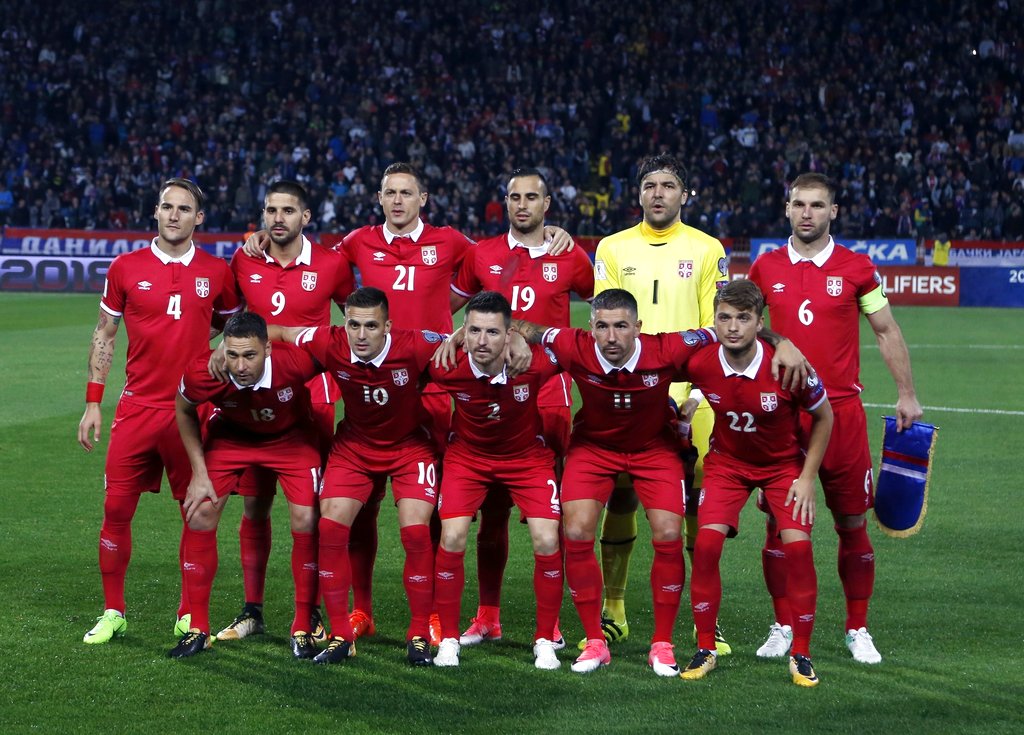
FILE – In this Monday, Oct. 9, 2017 filer, Serbian players pose for a team photo prior to the World Cup Group D qualifying soccer match between Serbia and Georgia at the Rajko Mitic stadium in Belgrade, Serbia. (AP Photo/Darko Vojinovic)
With a mandate to integrate the country’s promising young players into the squad, Serbia coach Mladen Krstajic was hired after the national team had already qualified for the World Cup.
He has abandoned some of the caution shown by predecessor Slavoljub Muslin, whose conservative selections helped Serbia win its European qualifying group after failing to reach the 2014 tournament.
The late shift in philosophy, however, has raised fears that Serbia’s consistent results could unravel.
One of seven national teams created after the breakup of Yugoslavia, Serbia has never made it past the group stage at a World Cup.
Here’s a closer look at the Serbia team:
COACH
A former national team defender and Bundesliga veteran, Mladen Krstajic is closely aligned with the federation’s wishes for the faster integration of the players who won the Under-20 World Cup in 2015.
He was first brought in as a caretaker after Muslin’s dismissal, despite having never held a previous coaching position. But he has yet to calm the national anxiety after delivering highs and lows on the road to Russia. The latest setback was a 1-0 loss to Chile in a friendly.
Unapologetic, Krstajic said the results of friendly matches were meaningless because they were only about preparation.
“You would expect experienced players to have better form, but younger players have more potential — that’s a fact. We have both,” he said. “Testing younger players in the game (against Chile) was a conscious decision, to see how they would combine with the players who got us qualification.”
GOALKEEPERS
The towering Vladimir Stojkovic was first choice during the qualification campaign, which exposed the team’s irregular form.
The Serbs conceded 10 goals in as many matches. The 34-year-old Stojkovic has bounced around half-a-dozen European leagues, making the rare switch from Red Star Belgrade to city rival Partizan.
Predrag Rajkovic, a 22-year-old former national youth team standout, made his senior debut at 18 and has put in another six appearances.
DEFENSE
Branislav Ivanovic has long been a defensive rock, playing more than 100 times for his country while winning trophies with Chelsea.
The center back seemed a natural choice to remain captain when Krstajic took over. Instead, he picked Roma left back Aleksandar Kolarov, a seven-year Manchester City veteran admired by English fans for his reliable form and viral online Christmas videos.
MIDFIELDERS
Muslin’s departure was blamed largely on his reluctance to use Sergej Milinkovic-Savic, the tall, fast and versatile Lazio central midfielder.
It was little surprise that the 23-year-old Milinkovic-Savic, called “the sergeant” in Italy for his commanding style, was included.
The country’s second highly bankable star is another midfielder, Nemanja Matic, who has so impressed Manchester United manager Jose Mourinho that he’s a potential captain for next season.
Serbia’s talent in midfield also includes attack-minded Luka Milivojevic, a regular scorer at Crystal Palace.
FORWARDS
Krstajic likes to field a 4-2-3-1 formation to exploit the goal-scoring talents of his midfield.
Aleksandar Mitrovic remains the preferred lone striker and he produced six goals in qualification. While his finishes often look unspectacular, the 23-year-old forward who plays at Fulham on loan has perfected close-range finishes.
Krstajic added some young forwards to his roster, including 20-year-old Benfica player Luka Jovic, who is on loan to Eintracht Frankfurt.
Fire-power may also come from Aleksandar Prijovic, the top scorer in the Greek league at PAOK Thessaloniki and hero at home for producing the winning goal against Georgia that sent Serbia through.
GROUP GAMES
Serbia will open against Costa Rica on Sunday in Samara. The team will then face Switzerland in Kaliningrad on June 22 before traveling to Moscow to face Brazil on June 27.
SQUAD
Goalkeepers: Vladimir Stojkovic (Partizan), Marko Dmitrovic (SD Eibar), Predrag Rajkovic (Maccabi Tel Aviv)
Defenders: Antonio Rukavina (Villarreal), Aleksandar Kolarov (Roma), Milan Rodic (Red Star Belgrade), Branislav Ivanovic (Zenit St. Petersburg), Uros Spajic (Anderlecht), Dusko Tosic (Guangzhou), Milos Veljkovic (Werder Bremen), Nikola Milenkovic (Fiorentina)
Midfielders: Luka Milivojevic (Crystal Palace), Nemanja Matic (Manchester United), Marko Grujic (Liverpool), Adem Ljajic (Torino), Sergej Milinkovic-Savic (Lazio), Dusan Tadic (Southampton), Filip Kostic (Hamburg), Andrija Zivkovic (Benfica), Nemanja Radonjic (Red Star Belgrade)
Forwards: Aleksandar Mitrovic (Newcastle), Aleksandar Prijovic (PAOK Thessaloniki), Luka Jovic (Benfica)

